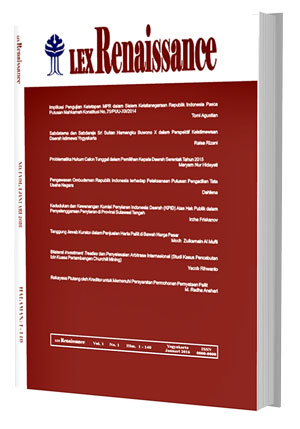Main Article Content
Abstract
Keywords
Article Details
Authors who publish with this journal agree to the following terms:
a. Authors retain copyright and grant the journal right of first publication with the work simultaneously licensed under a Creative Commons Attribution License that allows others to share the work with an acknowledgement of the work's authorship and initial publication in this journal.
b. Authors are able to enter into separate, additional contractual arrangements for the non-exclusive distribution of the journal's published version of the work (e.g., post it to an institutional repository or publish it in a book), with an acknowledgement of its initial publication in this journal.
c. Authors are permitted and encouraged to post their work online (e.g., in institutional repositories or on their website) prior to and during the submission process, as it can lead to productive exchanges, as well as earlier and greater citation of published work (See The Effect of Open Access).References
- Buku
- Achmad, Mukti Fajar dan Yulianto. Dualisme Penelitian Hukum Normatif dan Empiris, Pustaka Pelajar, Yogyakarta, 2010.
- Adjie, Habib, Hukum Notaris Indonesia Tafsir Tematik Terhadap UU No. 30 Tahun 2004 tentang Jabatan Notaris, Reflika Aditama, Bandung, 2008.
- Ali, H. Zainuddin, Metode Penelitian Hukum, Sinar Grafika, Jakarta, 2010.
- Dewi, Santia dan R.M. Fauwas Diradja, Paduan teori dan Praktik Notaris, PustakaYusticia, Yogyakarta, 2011.
- Pramudya, Kelik dan Ananto Widiatmoko, Pedoman Etika Profesi Aparat Hukum, Pustaka Yusticia, Yogyakarta, 2010.
- Soekanto, Soerjono, Pengantar Penelitian Hukum, UI Press, Jakarta, 1986.
- Sunggono, Bambang, Metodologi Penelitian Hukum, Raja Grafindo Persada, Jakarta, 2003.
- Syamsuddin, M., Operasionalisasi Penelitian Hukum, PT Raja Grafindo Persada, Jakarta, 2007.
- Makalah
- Sutrisno, “Tanggapan Terhadap Undang-undang No.30 Tahun 2004tentangJabatan Notaris”, Bahan Kuliah pada Kuliah Etika Profesi Notaris Magister Kenotariatan Universitas Sumatera Utara, Medan, 2007.
- Majalah
- Hadi, Mudofir, “Pembatalan Isi Akta Notaris Dengan Putusan Hakim”, Varia Peradilan, No. 72, 1991.
- Peraturan Perundang-Undangan
- Kitab Undang-Undang Hukum Perdata (Burgerlijk Wetboek).
- Undang-UndangNomor 30 Tahun 2004Tentang Jabatan Notaris, Lembaran Negara Republik Indonesia No. 117Tahun 2004, Tambahan Lembaran Negara Republik Indonesia No. 4432.
References
Buku
Achmad, Mukti Fajar dan Yulianto. Dualisme Penelitian Hukum Normatif dan Empiris, Pustaka Pelajar, Yogyakarta, 2010.
Adjie, Habib, Hukum Notaris Indonesia Tafsir Tematik Terhadap UU No. 30 Tahun 2004 tentang Jabatan Notaris, Reflika Aditama, Bandung, 2008.
Ali, H. Zainuddin, Metode Penelitian Hukum, Sinar Grafika, Jakarta, 2010.
Dewi, Santia dan R.M. Fauwas Diradja, Paduan teori dan Praktik Notaris, PustakaYusticia, Yogyakarta, 2011.
Pramudya, Kelik dan Ananto Widiatmoko, Pedoman Etika Profesi Aparat Hukum, Pustaka Yusticia, Yogyakarta, 2010.
Soekanto, Soerjono, Pengantar Penelitian Hukum, UI Press, Jakarta, 1986.
Sunggono, Bambang, Metodologi Penelitian Hukum, Raja Grafindo Persada, Jakarta, 2003.
Syamsuddin, M., Operasionalisasi Penelitian Hukum, PT Raja Grafindo Persada, Jakarta, 2007.
Makalah
Sutrisno, “Tanggapan Terhadap Undang-undang No.30 Tahun 2004tentangJabatan Notaris”, Bahan Kuliah pada Kuliah Etika Profesi Notaris Magister Kenotariatan Universitas Sumatera Utara, Medan, 2007.
Majalah
Hadi, Mudofir, “Pembatalan Isi Akta Notaris Dengan Putusan Hakim”, Varia Peradilan, No. 72, 1991.
Peraturan Perundang-Undangan
Kitab Undang-Undang Hukum Perdata (Burgerlijk Wetboek).
Undang-UndangNomor 30 Tahun 2004Tentang Jabatan Notaris, Lembaran Negara Republik Indonesia No. 117Tahun 2004, Tambahan Lembaran Negara Republik Indonesia No. 4432.




